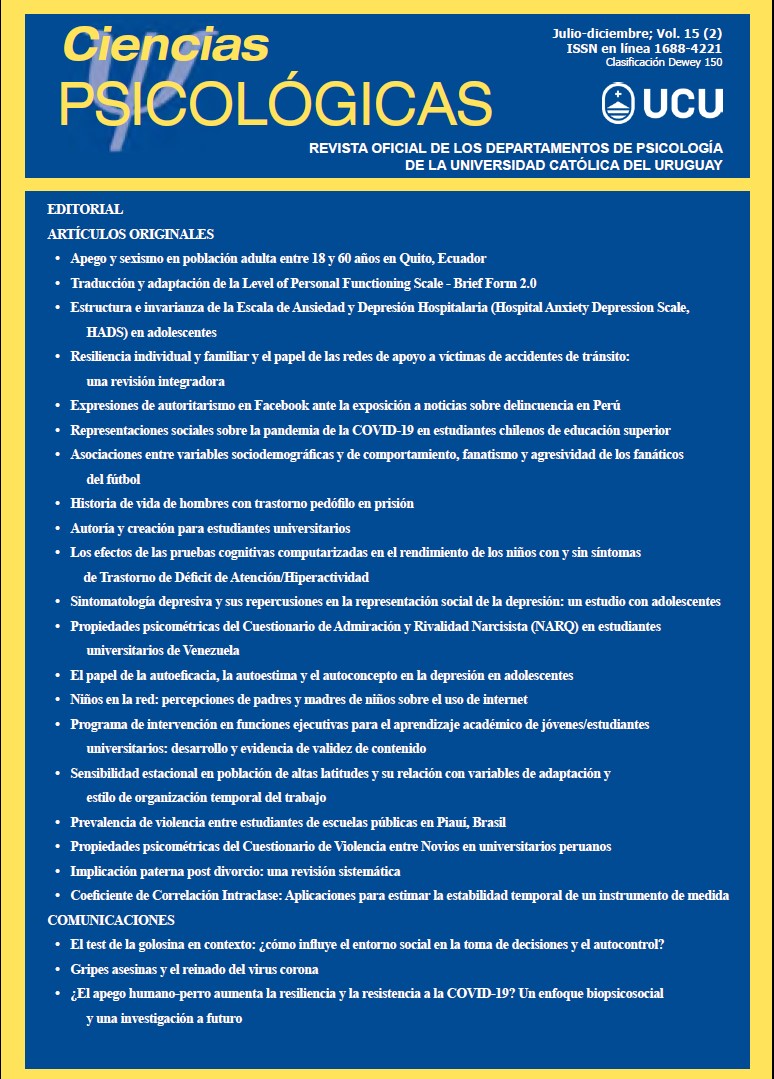The marshmallow test in context: How does the social environment influence decision-making and self-control?
DOI:
https://doi.org/10.22235/cp.v15i2.2486Keywords:
decision making, marshmallow test, self-control, delayed rewards, social contextAbstract
This article proposes a discussion of psychosocial factors that influence how humans make decisions related to self-control, emphasizing how preschoolers make those decisions in delayed reward situations. To this end, it takes as a starting point the marshmallow test placed in social context, to analyze how aspects such as rationality, emotions, socioeconomic status, culture and particularly trust in others influence how decisions are made and how self-control is exercised in relation to the delay of immediate rewards to obtain, subsequently, more beneficial results.
Downloads
References
Ariely, D. (2010). Predictably irrational: The hidden forces that shape our decisions (Revisado y ampliado). Harper Perennial.
Brighton, H. & Todd, P. (2009). Situationg rationality: ecologically rational decision making with simple heuristics. En Robbins, P., & Aydede, M. (Eds.), The Cambridge Handbook of Situated Cognition (pp. 322-346). Cambridge: Cambridge University Press.
Chaverri, P., Conejo, D., León, S., & Arrieta, A. (2020). Postergación de la gratificación en preescolares costarricenses: efecto de la confianza en la persona experimentadora y del estrato socioeconómico. Artículo en revisión.
Damasio, A. R. (1994). Descartes’ error: Emotion, reason, and the human brain. Putnam.
Damasio, A. (2018). El extraño orden de las cosas: La vida, los sentimientos y la creación de las culturas. Ediciones Destino.
Eagleman, D. (2017). The brain: The story of you. Vintage Penguin Random House.
Fehr, E. (2009). Social Preferences and the Brain. En P. W. Glimcher, C. F. Camerer, E. Fehr, & R. A. Poldrack (Eds.), Neuroeconomics (pp. 215-232). Academic Press. doi: https://doi.org/10.1016/B978-0-12-374176-9.00015-4
Güth, W., Schmittberger, R., & Schwarze, B. (1982). An experimental analysis of ultimatum bargaining. Journal of Economic Behavior & Organization, 3(4), 367-388. doi: https://doi.org/10.1016/0167-2681(82)90011-7
Jensen, K., Call, J., & Tomasello, M. (2007). Chimpanzees Are Rational Maximizers in an Ultimatum Game. Science, 318(5847), 107-109. doi: https://doi.org/10.1126/science.1145850
Kahneman, D. (2011). Thinking, fast and slow (1° ed.). Farrar, Straus and Giroux.
Kidd, C., Palmeri, H., & Aslin, R. N. (2013). Rational snacking: Young children’s decision-making on the marshmallow task is moderated by beliefs about environmental reliability. Cognition, 126(1), 109-114. doi: https://doi.org/10.1016/j.cognition.2012.08.004
Lamm, B., Keller, H., Teiser, J., Yovsi, R., Suhrke, J., Vohringer, I., Knopf, M., Lohaus, A., Gudi, H., Freitag, C., Fassbender, I., Teubert, M. & Schwarzer, G. (2018). Waiting for the Second Treat: Developing Culture-Specific Modes of Self-Regulation. Child Development, 89(3), e261-e277. doi: https://doi.org/10.1111/cdev.12847
Michaelson, L. E., & Munakata, Y. (2016). Trust matters: Seeing how an adult treats another person influences preschoolers’ willingness to delay gratification. Developmental Science, 19(6), 1011-1019. doi: https://doi.org/10.1111/desc.12388
Mischel, W. (2014). The marshmallow test: Mastering self-control. Little, Brown and Company.
Mischel, W., & Staub, E. (1965). Effects of expectancy on working and waiting for larger rewards. Journal of Personality and Social Psychology, 2, 625-633. doi: https://doi.org/10.1037/h0022677
Robbins, P., & Aydede, M. (Eds.). (2009). The Cambridge handbook of situated cognition. Cambridge University Press.
Sanfey, A. G., Rilling, J. K., Aronson, J. A., Nystrom, L. E., & Cohen, J. D. (2003). The Neural Basis of Economic Decision-Making in the Ultimatum Game. Science, 300(5626), 1755-1758. doi: https://doi.org/10.1126/science.1082976
Siegel, D. J. (2016). Guía de neurobiología interpersonal: Un manual integrativo de la mente. Eleftheria.
Shah, A. K., Mullainathan, S., & Shafir, E. (2012). Some consequences of having too little. Science, 338(6107), 682-685. doi: https://doi.org/10.1126/science.1222426
Shoda, Y., Mischel, W., & Peake, P. K. (1990). Predicting adolescent cognitive and social competence from preschool delay of gratification: Identifying diagnostic conditions. Developmental Psychology, 26, 978-986. doi: https://doi.org/10.1037/0012-1649.26.6.978
Slovic, P. (1990). Choice. En: D. Osherson, E. Smith (Eds.). An invitation to cognitive science: Vol. 3. Thinking (pp. 89-116). MIT Press.
Smith, E. E. & Kosslyn, S. M. (2012). Procesos cognitivos: Modelos y bases neuronales. Pearson Prentice Hall.
Sternberg, R. J., Espinosa Rodríguez, J., Ortíz Salinas, M. E., & Reyes Ponce, L. (2011). Psicología Cognoscitiva. Cengage Learning.
Thagard, P. (2019). Mind-society: From brains to social sciences and professions. Oxford University Press. doi: https://doi.org/10.1093/oso/9780190678722.001.0001
Todd, P. M., & Gigerenzer, G. (Eds.). (2012). Ecological rationality: Intelligence in the world. Oxford University Press. doi: https://doi.org/10.1093/acprof:oso/9780195315448.001.0001
Watts, T. W., Duncan, G. J., & Quan, H. (2018). Revisiting the Marshmallow Test: A Conceptual Replication Investigating Links Between Early Delay of Gratification and Later Outcomes. Psychological Science, 29(7), 1159-1177. doi: https://doi.org/10.1177/0956797618761661
Downloads
Published
How to Cite
Issue
Section
License
Copyright (c) 2021 Universidad Católica del Uruguay

This work is licensed under a Creative Commons Attribution 4.0 International License.
















